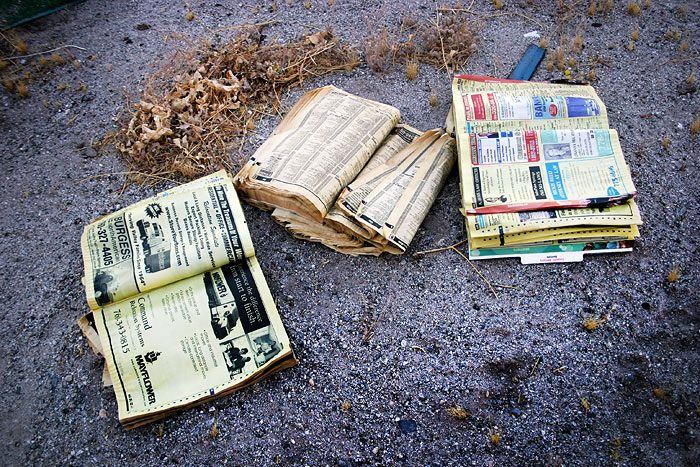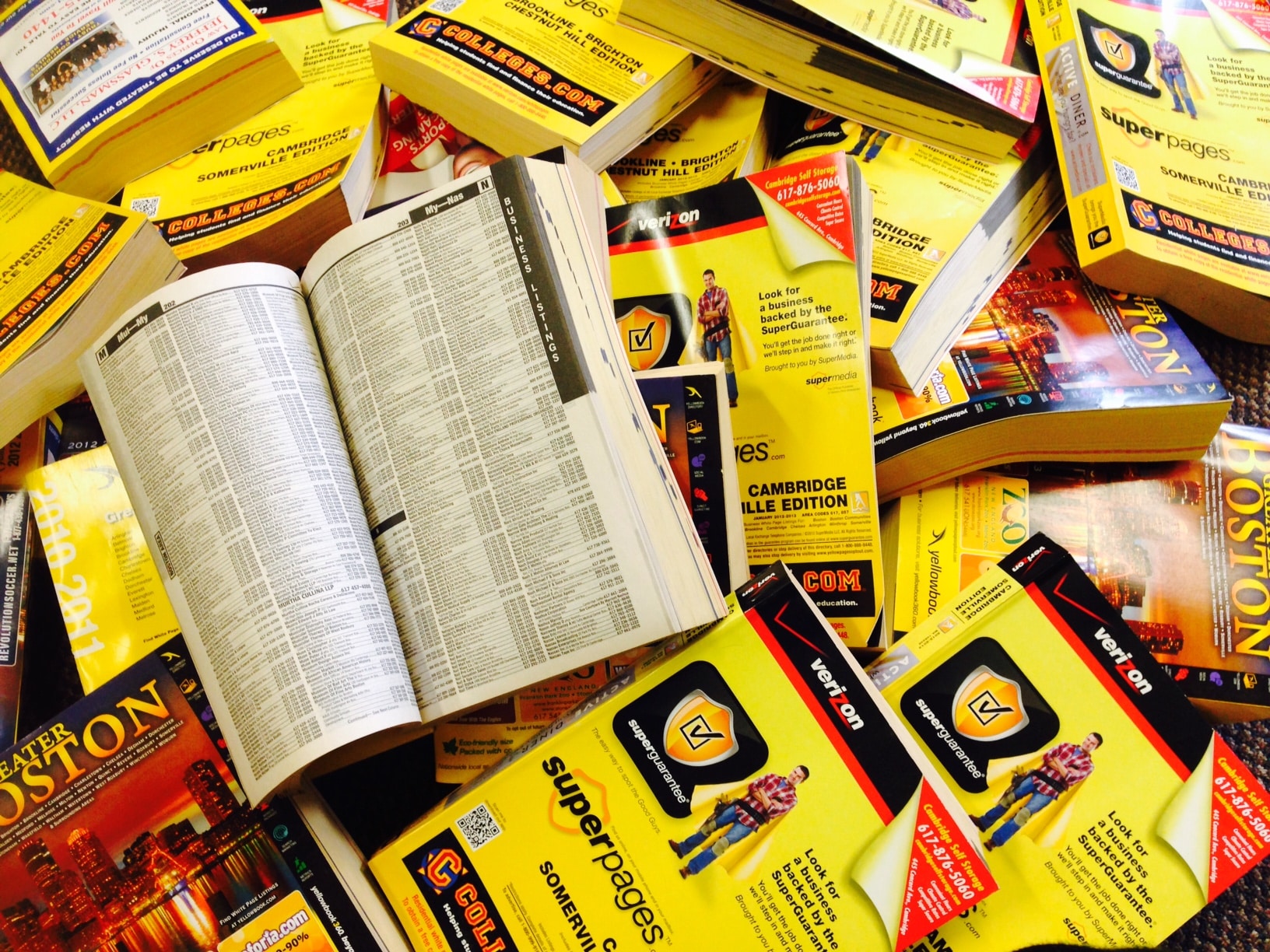by Megan Byers

In the past year, PSI documented more than 29,000 opt-outs generated through our Phone Book Opt-Out Toolkit, a trove of public outreach materials that makes promoting opt-out as easy as copy-and-paste for governments, environmental organizations, and concerned citizens.
We asked people to rate how easy or difficult it is to opt out on the industry-run opt-out website via an anonymous survey. 74 percent of respondents provided additional feedback to elaborate on their experience. Here’s what we learned:
- 69 percent of respondents found the opt-out website “very easy” or “easy” to use.
PSI commends the industry for creating a website that is easy for many people to use.
“The site was easy to use and the link easy to share so more people could reduce the number of unwanted phone books! Thanks.”
- But over a third of respondents thought the process was too long and confusing. Some even gave up.
The website does not make it clear from the start that opting out is a multi-step process. Counter intuitively, you have to register to unregister from phone book distribution. Common criticisms include that the opt-out process is too time consuming, the website is not mobile friendly, and it is annoying to create an account. Some respondents said that it would be easier to opt in than opt out, and that it felt like the website was intentionally designed to make people feel uncomfortable and confused, thus preventing completed opt-outs.
“You asked for a lot of information and it was time consuming to have to wait for the email so I could complete the opt out.”
“I gave up because it was so complicated. At some point I needed a password to register.”
- One in five respondents who gave additional feedback were wary of giving up personal information like their name, email address, and phone number in addition to their address.
The opt-out website promises that all information required is used only for verification purposes. Still, some survey respondents were skeptical.
“I hate giving out my name, personal phone in order to opt out.”
- 40 percent of respondents who gave additional feedback reported that it didn’t work – they still got phone books after opting out.
It is notable that PSI’s survey did not ask about opt-out outcomes (after all, we merely intended to capture feedback about the opt-out process). Nevertheless, many respondents wrote that phone book deliveries continued after opt-out.
“I opted out – about 5 years ago – yet I continue to get phone books delivered to me (including another one this weekend)! After each incident, I’ve directly emailed my contacts at Local Search Association and reported the unwanted delivery. Each time, they’ve reached out to the specific publisher to “address the issue,” but despite this, I continue to get phone books. Very frustrating. It doesn’t appear to be working due to either publishers not providing their delivery people with opt-out lists or the delivery people just ignoring the lists if they are provided. So 4 years of unwanted deliveries (post-opt-out) and counting…”
PSI applauds the phone book industry for supporting an opt-out website that most people find easy to use. Now, we urge improvements that would make opting out easy, accessible, and comfortable for all. The feedback PSI has gathered is a good place to start.
We fully recognize that delivering directories to some buildings but not others has very real challenges and requires time, effort, investment, technology, and good communication with distributors. But if any other service failed to do what it promised almost half the time, it would quickly be replaced. If the industry’s opt-out system can’t actually honor half of the requests they receive, we must ask: isn’t there a better way?
It is time for the Local Search Association to implement an opt-in system. This way, those who want phone books could easily opt into delivery by signing up online, mailing in a slip, or calling the publisher. Those who don’t use phone books would avoid environmental and economic impacts while keeping their homes clutter-free. Furthermore, local businesses could more accurately assess how to best spend their advertising budget and target their phone book ads to the right audience. To sustain advertising revenue, publishers should expand and improve online offerings to make YellowPages.com the number one stop for consumers in need of local business information.
Phone books should be delivered only to consumers who request them – just like any other product.
Until an opt-in system is available, the best option to stop phone book delivery is to opt out. If you still receive a phone book despite opting out, we encourage you to call both the publisher and Neg Norton, President of the Local Search Association, which runs YellowPagesOptOut.com.
Look in your phone book for a publisher name and find them online, or browse our list of top publishers. Mr. Norton can be reached at (908) 286-2385 or Neg.Norton@localsearchassociation.org.
Questions? Contact PSI’s Megan Byers.
By Scott Cassel, Chief Executive Officer & Founder, Product Stewardship Institute

Well, we’re pretty convinced there’s a problem – in both accountability and sustainability.
Here’s why:
Miller states, “clearly you need some real data on the amount of directories and what the recovery rate is…”
The data the Local Search Association (LSA) cites publicly – a 67% recycling rate – combines many types of printed paper including newspaper recycling, making it impossible to understand where phone books lie. The last time the U.S. EPA measured the recycling rate of telephone directories alone (in 2009), the rate was 37%. We would love to find out the current recovery rate of telephone directories, and acknowledge any improvement.
The lack of publicly available data also paints a picture – publishers are happy to greenwash the public with vague statements about using sustainable paper, but unwilling to give the real data to back up their claims, despite PSI’s multiple requests for information.
In making use of what data is available, PSI found that only 23% of major publishers use paper from “sustainably managed forests” (and none identify a specific certification program); 15% offer support for recycling infrastructure; and only 31% of publishers specify the percentage of recycled content paper used in their books.
Miller states, regarding directories, “They’re absolutely invaluable for the white paper aspect… they’re trying to deliver information people can use. It’s a little imperious for PSI to say ‘it’s my way or the highway.’”
PSI believes that phone books do deliver information people can use, and by advocating for opt-in and opt-out programs, we seek to ensure that people who want phone books continue to receive them.
However, we also believe that all businesses have a responsibility to manage their products sustainably.
That is the goal of this report card: to shine light on those publishers following best practices in sustainability, and to encourage others to follow their lead. We have engaged with the industry in the past, holding a stakeholder meeting in 2008 and 2009. We’d like to do it again.
In short, we are more than happy to cooperate with the publishers to increase sustainability and transparency– if they are willing.

My father was a small businessman. He ran a four-person employment agency called Able Careers in Hackensack, New Jersey, and was proud of the jobs he got for his people. Each week, I watched him meticulously cut his advertisements out of the newspaper to make sure they were displayed correctly. And, of course, he was listed in the Yellow Pages. Able Careers was right at the top of the A column in the book under Employment Agencies.
That was then. When multiple phone books were stacked on everyone’s desk, and they were the bible for people, places, and things.
I don’t need to tell you that those days are over. But what has not stopped is the continuous printing and distribution of these books, which are often unwanted and not needed. Apparently, directory publishers have not found a way to match the advertising revenue over the internet that they make on printed directories. So they make them, and dump them on our doorsteps.
About ten years ago, PSI and our local and state government members educated the industry about how these books cost local governments about $60 million in management costs. Whether recycled or disposed, there is a cost to deal with phone books. And taxpayers pick up the tab for the industry. To their credit, and in response to PSI’s requests, the phone book industry developed an online system for residents to opt out of receiving the books. Unfortunately, PSI is still receiving citizen complaints. Only two publishers track opt out requests, and no one knows if they are being honored.
We asked the industry to discuss this with us. But, ever since they won a lawsuit against the City of Seattle, which wanted the industry to pay for developing its more robust opt out system a few years back, the industry association has shut down. They have stonewalled us.
In 2014, PSI decided to grade directory publishers on their sustainability efforts in three categories: opt out (including transparency); sustainable production (paper, ink); and recycling (education/financing). The Local Search Association (LSA) responded by not addressing any of the information in our report card, instead putting out a sustainability report that made unsubstantiated claims.
This year, we figured we would give the industry another chance to redeem themselves, and let them know we were again going to create a Sustainability Report Card to seek industry best practices on phone book sustainability.
Again, we were stonewalled. The response to our well researched report, delivered by Wesley Young of the LSA, was a flimsy infographic claiming that publishers reduced paper use over their lifetime and claiming an inflated recycling rate that they did not substantiate. Keep America Beautiful’s Brenda Pulley joined the LSA’s greenwashing efforts with a quote supporting them as a great partner (LSA funds KAB as a sponsor in the $5,000-$9,999 category).
Those of us in the environmental business know that there are entrenched interests, like directory publishers, who want to uphold the status quo and do not want outside forces, like PSI, meddling with their business. We are used to the climate change deniers, who would rather drown from melting icecaps than make decisions using sound data.
We expect this from dying industries like the LSA that cling to outdated ideas and fail to innovate. But what is their responsibility to you, the rest of America, which has to pay the price of phone books that are dumped on your doorstep?
Let’s face it, phone books are not the Number 1 environmental priority. I know that. They know that. But is this the way that industries should respond when presented with the fact that they are harming us? Why do we have to clean up their mess? And when we offer to help them, why are we met with greenwashing that evades the issues?
PSI has taken action. We have gathered the facts, which point to changes needed by publishers, even as some are following best practices. And we have presented them to you.
Now, what are you going to do about it?
Let Neg Norton at the LSA know what you think of his industry’s greenwashing. And while you’re at it, let Jennifer Jehn know that their funding from the LSA isn’t worth the harm it does to Keep America Beautiful’s reputation. Thank you.
By Scott Cassel, Chief Executive Officer & Founder, Product Stewardship Institute
What did the Product Stewardship Institute (PSI) get when we attempted to work with the phone book industry?
Obstruction.
In our recent Sustainability Report Card, PSI applauded the phone book industry for taking steps forward in sustainability. We recognized publishers’ efforts to promote opt-out programs and highlighted their recycling initiatives. We also indicated key areas in which these publishers can improve, such as using recycled-content paper and contributing to recycling infrastructure. Our goal was to help industry to satisfy consumer demand for improved environmental practices.

In an effort to bring clarity to residents and advertisers, last year PSI published its first Sustainability Report Card evaluating six major yellow pages publishers. Only one of the six companies offered any information. Despite an unwillingness to cooperate, the industry was clearly irritated by poor grades that reflected their lack of transparency.
At PSI, we strive to collaborate with industry. Which is why we reached out, again, to Wesley Young, Vice President of Public Affairs at the Local Search Association (LSA), to get information that would help us put together our second report card.
Here is Wesley Young’s response:
Dear Scott,
Thanks for your email. This email is my personal opinion and I am not speaking on behalf of my members, but I respectfully decline your offer. Your use of data that is 6+ years old and continuing representation of it as the current state is misleading when many things have changed since then. And even that old data showed a trend of significant increases in the growth rate of directory recycling until the EPA stopped tracking them separately. Also, last year’s phone book report ignored industry sources and was based on a presumption of failure that demonstrates a bias against the industry.
These are a couple of reasons why I am declining your offer. You are welcome to contact my members individually to see if they feel differently.
Interestingly, even though Mr. Young stressed he wasn’t speaking on behalf of the LSA’s members, when we reached out to Sarah Wilson, Senior Staff Consultant at Dex Media, she responded using strikingly similar language. (She wrote to “respectfully decline,” citing PSI’s “use of outdated information” and “bias.”) Let me address their complaints point by point:
1) Charge: PSI used “data that is 6+ years old.”
Fact: There is a reason we use recycling numbers from 2009: this is the last year that the U.S. Environmental Protection Agency (EPA) separated the recycling rate of phone books from that of other printed paper. The recycling rate in 2009 was 36.9% for directories and 88.1% for newspapers. Today, the combined rate is 67.0% for those two groups, plus other mechanical papers. There is no way to determine if today’s combined rate demonstrates an increase in phone book recycling from 2009; yet this is just what the industry and Keep America Beautiful lead readers to believe in their 2014 report and recent infographic. We hope the industry will join us in pushing for more accurate data.
2) Charge: PSI’s first report card “ignored industry sources and was based on a presumption of failure.”
Fact: PSI actively sought out publisher contributions for both the first and second report cards. The majority of publishers refused to respond to our inquiries, and those who did referred us to the 2014 LSA Sustainability Report. Unfortunately, many claims in this report lack verification. For instance, the report states:
“One of our supplier members collaborates with customers to help minimize environmental impacts by forming associations with sustainable forestry initiatives and sourcing more sustainable inks.”
(Which forestry initiatives? What does it mean to “associate”? And what inks do they source?)
“One of our print members encourages the use of recycled and forest management certified papers to the greatest extent practicable.”
(What does “to the greatest extent practicable” mean? Is it 50%? Or 10%? Which forest management certifier are they using? Is it post or pre-consumer recycled paper?)
When we asked these questions, the LSA refused to comment.
3) Charge: PSI ignored the fact that EPA data showed “a trend of significant increases in the growth rate of directory recycling.”
Fact: PSI would love to commend directory publishers for an increased recycling rate. We’re looking for a success story. But the LSA has it wrong: the EPA’s cited recycling rate of printed paper has actually decreased since directories were looped into the combined number. That’s not to say that the phone book recycling rate didn’t increase. Due to the industry’s lack of cooperation, we simply don’t have the information to justify praise.
In fact, PSI recently sent a letter to the EPA requesting it calculate telephone directory generation and recovery separately than other printed paper to give a clearer understanding of the industry’s sustainability performance.
We would hope the industry – and recycling organizations like Keep America Beautiful – would refuse to settle for anything less. We know it’s what many of our hundreds of members want.
Last week, in the President’s State of the Union address, he challenged the nation to tap into our entrepreneurial spirit so we can better compete against China, India, and other countries that have invested heavily in their own country’s future. He spoke of a role of government that is nuanced – one that can work with the market, where government can guide development through policies that make us more competitive.
Product stewardship seeks limited governance that sets broad parameters for market competition. It seeks a greater role for the private sector, shifting the management and financial burdens from often inefficient government practices to those driven by market forces. Managing products that we call “waste” is nothing but inefficiencies in the market. It is a market failure. And that failure has resulted in billions of dollars of taxpayer costs to subsidize businesses whose products are manufactured and sold without consideration for their social and environmental costs.
How is it possible that telephone directories are still produced and distributed across the United States at the current rate? No one knows for sure how many people still use them, although most people I talk to don’t, except perhaps my over-80 parents and a few die-hards. Over 660,000 tons of directories get plunked onto our doorsteps, pathways, driveways, and vestibules each year. Less than a quarter are recycled. All must be collected and recycled or disposed of by government and paid for by government, with complaints being dealt with by government. That is the same Government that Tea Party leaders want to get out of business and get out of the business of business. It is time to heed their call.
Phone books keep getting delivered at their current rate of excess because the external costs of managing the directories after they are kerplunked is paid for by taxpayers, all $64 million of it. Whether we use one or not, we are all subsidizing telephone companies like AT&T and Verizon, and independent directory publishers like Dex and Yellow Book. Not only are we paying financially for their inefficient ways, but these companies are not covering the true cost of their impacts on our environment. They do not pay for the greenhouse gas impacts that the production of directories causes, or the stress on our water or air as the result of factories producing books no one wants, or emissions from trucks that transport them, deliver them, and pick them up, or pollution from the facilities that recycle them or dispose of them.
I picked on phone books here because they are visible and a clear waste if no one wants them. But this argument can be made on all products produced worldwide. Some companies have taken steps to reduce the lifecycle impacts of their products, and these leaders should be applauded. Others have taken a lead on turning materials from used products into usable commodities.
The United States can be a global leader in competitiveness. We are still the world’s market powerhouse. Product stewardship can maintain this strength through the efficient use of our nation’s resources, whether they are mined from the earth or mined from our households and businesses after use. Product stewardship policies seek good governance, not NO governance. Government should not “get out of the way” and let business run rampant. Haven’t we seen that movie before with the crises from banking, housing, and credit card deregulation? The government’s role in good product stewardship programs is limited to setting parameters for industry, guiding it, enforcing against those who cheat and want a free ride, and encouraging companies that are the true leaders of innovation to succeed.
